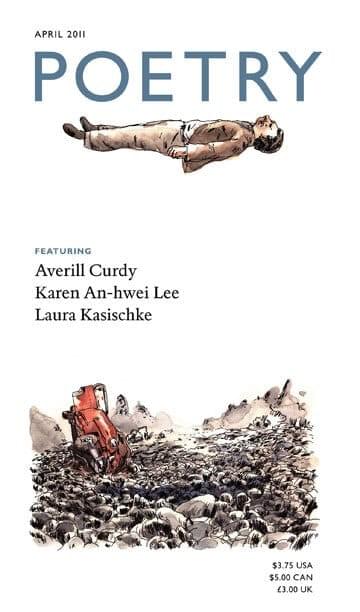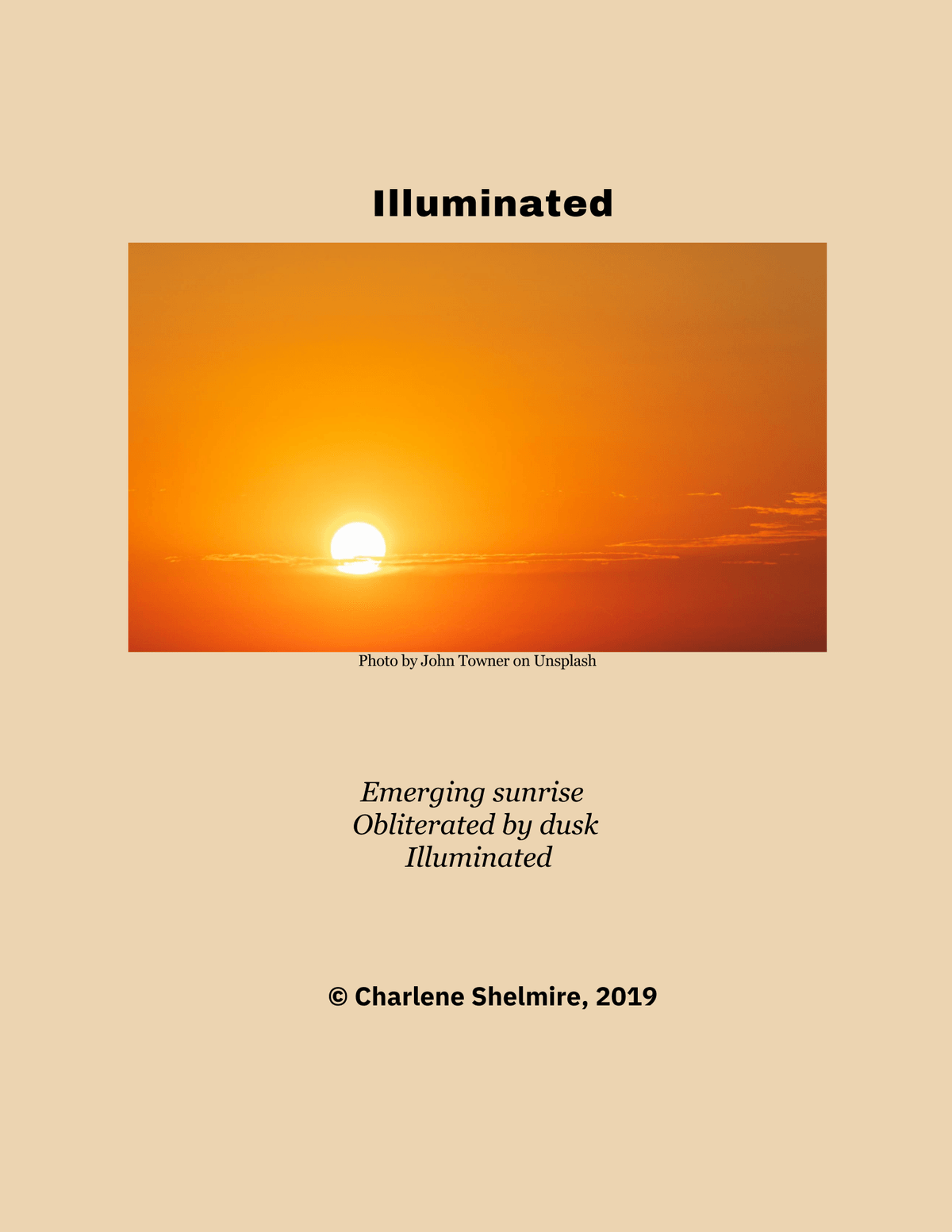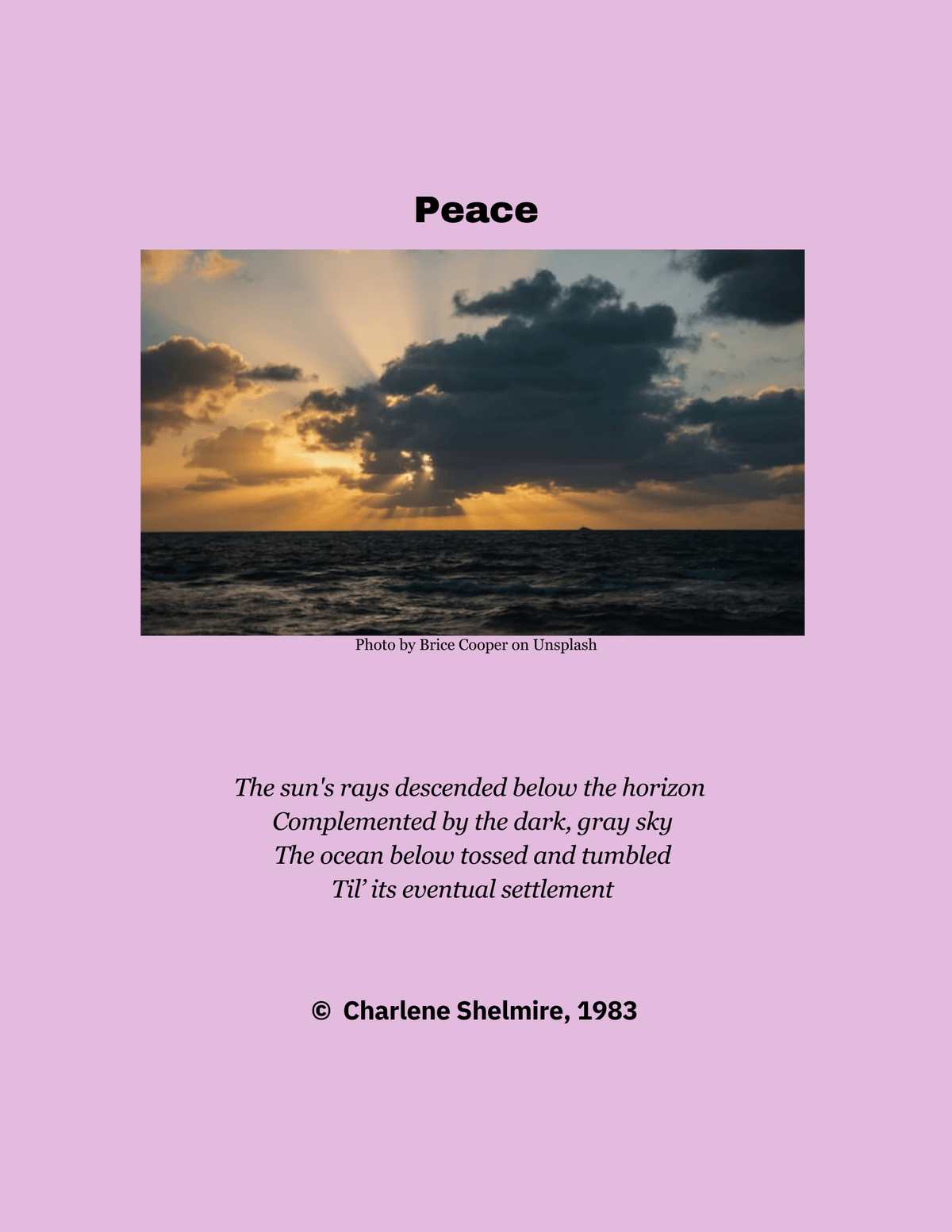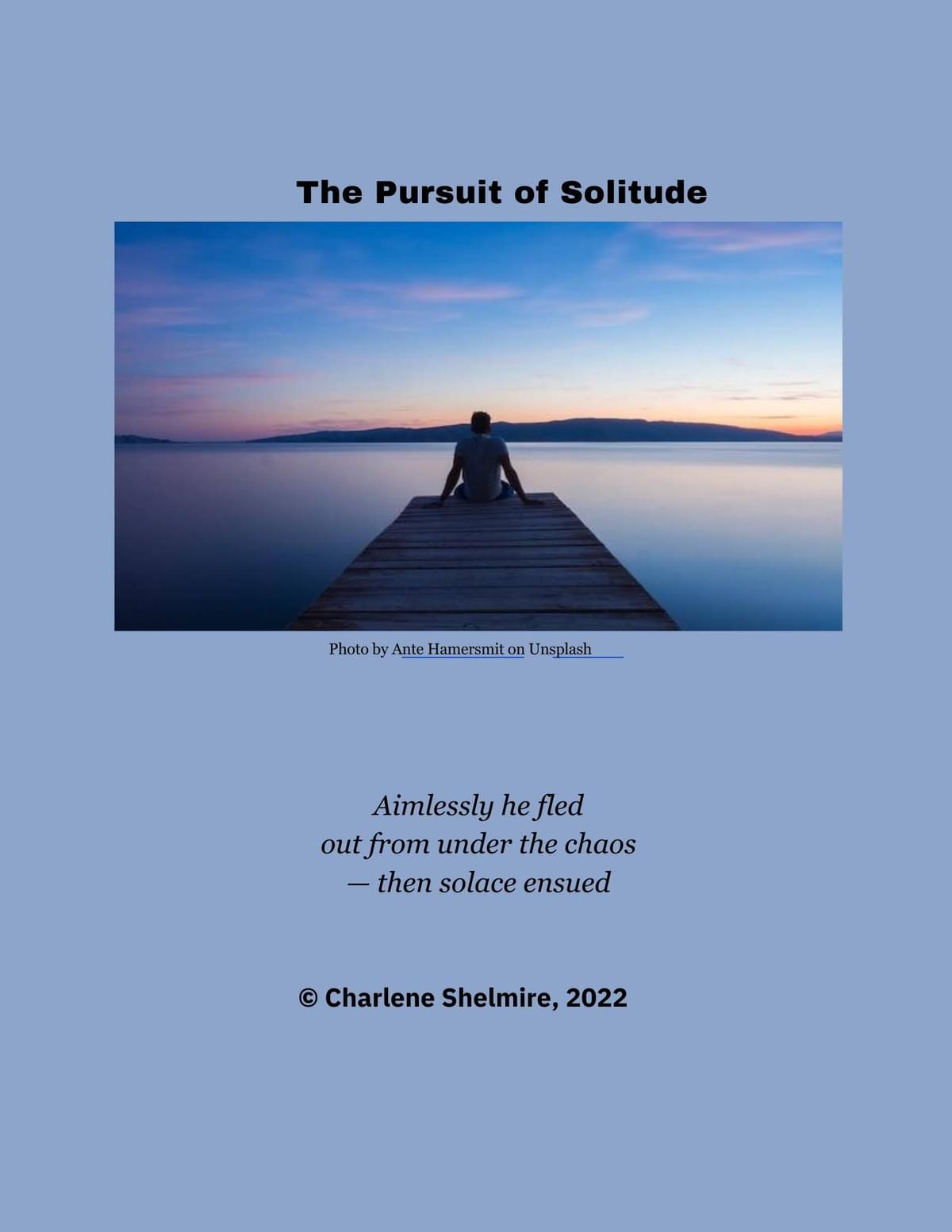

POETRY
Featured Poetry
Haiku and Free Verse

Haiku
An amazing transformation takes place between sunset and sunrise, resulting in an illuminated sky. This is a fascinating phenomenon that leaves many awestruck.

Free Verse
This one-stanza poem sets the scene for what precedes a sense of calmness and serenity. The use of descriptive environmental imagery successfully conveyed this idea.

Haiku
Longing to escape conflict and stress can lead to a "fight or flight" response. This short poem indicates the "flight" response that many succumb to when under pressure.
My Journey Into Writing Poetry
I believe that poetry has an amazing creative outlet for aspiring writers, and has the ability to entertain, inspire, and enlighten its readers.
I've always been fascinated with creative writing since my 9th-grade high school teacher announced an upcoming short story contest. To my surprise, I was one of the two winners of the competition.
That same year, I reluctantly challenged myself by entering the Bob Hope Poetry Writing Competition, where I received an honorable mention.
After being bitten by the creative writing bug, I sought to expand my knowledge, becoming an avid reader and writer of Renaissance-era poetry and short stories.
Although I developed an interest in both literary art forms, my love for poetry grew significantly.
Over time, I began to focus more on writing poetry and less on short stories. While I enjoy writing across diverse genres, I've discovered the most fun in writing haiku, free-verse, tanka, and lyric poetry.
As my passion for poetry deepened, I joined a local poetry group, where the club’s president provided monthly writing prompts. The group members were also required to share and critique one another’s work.
I'm grateful for the inspiration and valuable experience gained from participating in that group. Fast forward to 2024, I decided to write new poems and revisit some old ones to share on this general writing portfolio website.
One of my favorite poetic forms is the ballad quatrain, consisting of four-line stanzas with an alternating rhyme scheme (abcb), where the rhyme occurs in the last word of lines two and four.
My poetry collection showcases a variety of forms, including haiku, free verse, lyric, and tanka poetry.

FUN FACT
What's the connection between painting and poetry?
The answer to this question is summed up in a quote from a renowned Italian Renaissance Era painter and sculptor.
"Painting is poetry that is seen rather than felt, and poetry is painting that is felt rather than seen."
Leonardo da Vinci
About my poetry collection…
If asked to state my top favorite poetic form, I'd choose the Japanese haiku because they are super short, and fun to write.
Nevertheless, they're challenging to write because this three-line poem form must make sense and flow well.
Also, it's imperative to adhere to its restrictive structure regarding the syllable count, line length, and abstract meaning.
Another favorite form of mine is free verse, which permits the poet to create without rigid restrictions on line count, syllables, or rhyme scheme.
The following poem collection is preceded by brief descriptions of its unique structure (e.g., line, stanza, and syllable count).

My Poetry Collection
Copyright ©Charlene Shelmire, 2023
Haiku
"A traditional Japanese haiku is a three-line poem with a seventeen (5/7/5) syllable count. Often focusing on images from nature, haiku emphasizes simplicity, intensity, and directness of expression."
Pursuit of Solitude
Aimlessly he fled,
out from under the chaos—
then solace ensued.
Illuminated
The emerging sun
obliterated the dusk.
Illuminated
Beneath the Ocean Waves
Beneath the ocean,
lies aqua-blue, crystal-clear
dazzling waters waves.
Broken Tree Trunk
The turbulent wind
violently swayed the tree
'til its dissection.
Hurricane
Brutal howling winds
Torrential rain,
and peeled roofs
Natural disaster
Originality
An innovator
embraces uniqueness, but
shuns replication
Cumulus Clouds
Fluffy, white as snow
Cottony, mashed potatoes
Delish—yum, yum,yum
Free Verse
"Free verse is the name given to poetry that doesn’t use any strict meter or rhyme scheme. Because it has no set
meter, poems written in free verse can have lines of any length, from a single word to much longer."
Racism
Excerpt from my Black History Month article,
"Police Brutality—The Systematic Racism of the Uniformed KKK."
You rejected the uniqueness
of my skin pigmentation.
You stripped my authenticity
by oppressing my voice.
You beat and bound me
with your whips and chains.
You altered my identity,
and robbed me of my dignity.
You obstructed my freedom,
and ignored all my pleas.
You averted humanness,
but embraced unjust cruelty.
Dog Days of Summer
Free verse poem excerpt from my science-based essay,
"How the Earth's Shifting Triggers Torrid Temps."
Blazing sun rays ascend—
over the horizon.
Soaring temps climbed
in the Orient.
The galaxy’s shiniest,
and brightest star—Sirius
—illuminates the vast,
brightly-lit sky.
As night falls, Sirius rises,
and twinkles above the earth,
emanating scorching heat,
and rendering miserable,
summer days, and nights,
— ushering in those—
hot dog days of summer.
Wounded Warrior
Though anguish firmly gripped
his wounded soul, the warrior
never stopped to nurture
his bleeding wounds.
The warrior refused to succumb
to cowardice; instead, he
persevered through tough
challenges — knocking down
walls of limitation —and
re-emerged as a brave champion.
His survival proved that his adversity
was the catalyst for his resilience.
Resurgence of Hope
Dreams do fade
into utter oblivion, then
as fate shifts its course—
hope re-emerges
Lone Drifter
Aimlessly, he strolled on
a path to nowhere land.
Devoid of a guiding compass,
he journeyed far and wide.
Realizing his aversion
to stability, and tendency
toward complacency, he
finally discovered that
his true identity was,
in fact,— The Lone Drifter.
Good Morning Spring!
Winter storms subside;
cozy climate emerges
Crystalized drops of dew
saturates budding flowers.
Moisture envelopes terrain;
insects graze sweet nectar
Soaring birds fly high while
melodiously trilling its song.
Imprisoned
He is confined between prison walls
Though he's restrained; he's liberated
Trapped, but still going places
Oppressed, but still uplifted
Bound, yet shackle-free
Pandemic
Staring intensely out her window — longing to
escape confinement to her four-wall prison.
She relentlessly sought liberation from the
restrictions, and curfews imposed upon her.
She daredn’t succumb to despair, but
she lifted herself from the depths of
captivity and loudly shouted, "End my
misery, release these shackles,
free me now, and let me go!"
Sleeping Bayou
An overcast sky
high humidity,
mosquitoes flying,
birds-a-chirping, strong
tall, massively branched,
moss-filled cypress trees,
hovers over the dark,
alligator-infested waters.
The bayou’s atmosphere is
serene and devoid of activity,
but even in its muteness; it
makes beautiful, quiet music.
Shh! Listen to the melody
of the sleeping bayou.
Explore it. Adore it.
Capture its unseen beauty.
Winter Blues
Howling winds, cold and brutal
Ground enveloped with snow
Dead leaves, softly falling
Inclement weather, storms blow
Bones quiver, teeth-chatters
Vanishing smiles, emerging gloom
Barricaded, trapped inside
Yearning sunlight, returns soon
Sweet Blooming Gardenias
Flaunting its classy hue,
and distinctive shape.
Its sensual fragrance emanates
while a gentle summer breeze
whispers through its soft,
white pedals.
Ah, those sweet gardenias!

Procrastination
Procrastination—impedes productivity,
diminishes drive, squanders away
precious time, and kills inspiration.
Lyric
"Lyric poetry refers to a short poem, often with songlike qualities, that expresses the speaker’s personal emotions and feelings. Historically intended to be sung and accompany musical instrumentation, lyric now describes a broad category of non-narrative poetry, including elegies, odes, and sonnets."
Expressions
Dark clouds, dominate the sky
Lightning bolts, with roaring thunder
Pouring rain, blinding my eyes
Blinding my eyes, blinding my eyes,
Blinding my eyes, so that I can’t see
I can’t see
Troubles of life, piercing my heart
Oftentimes, I wonder if my pain
Will ever cease, will it go away,
When will it go? Please let it go,
Please let it go, let it go away
Never return, don't come back,
I don't want you here
I’m taken captive by sorrow
Overwhelming despair, flooding
my mind, robbing my peace
I can’t sleep, I can’t breathe
Suffocating in grief
Heartaches and obstacles
I must bear, makes me ponder,
and conclude, “Why me, is this
Is this how life should be?”
All of my dreams are fading away Into
blissless hope each passing day
Passing day, can’t see my way
Dark clouds can't stay, please go away
I want to breathe, wanna breathe again
Breathe again, breathe again,
breathe aga--- (fade-out)
Poetry Spotlight
"I Know Why the Caged Bird Sings" by Poetist, Maya Angelou

You may write me down in history
With your bitter, twisted lies,
You may trod me in the very dirt
But still, like dust, I'll rise.
Does my sassiness upset you?
Why are you beset with gloom?
’Cause I walk like I've got oil wells
Pumping in my living room.
Just like moons and like suns,
With the certainty of tides,
Just like hopes springing high,
Still I'll rise.
Did you want to see me broken?
Bowed head and lowered eyes?
Shoulders falling down like teardrops,
Weakened by my soulful cries?
Does my haughtiness offend you?
Don't you take it awful hard
’Cause I laugh like I've got gold mines
Diggin’ in my own backyard.
You may shoot me with your words,
You may cut me with your eyes,
You may kill me with your hatefulness,
But still, like air, I’ll rise.
Does my sexiness upset you?
Does it come as a surprise
That I dance like I've got diamonds
At the meeting of my thighs?
Out of the huts of history’s shame
I rise
Up from a past that’s rooted in pain
I rise
I'm a black ocean, leaping and wide,
Welling and swelling I bear in the tide.
Leaving behind nights of terror and fear
I rise
Into a daybreak that’s wondrously clear
I rise
Bringing the gifts that my ancestors gave,
I am the dream and the hope of the slave.
I rise
I rise
I rise.
Citation: ("Angelou, Maya. (1969). I Know Why the Caged Bird Sings.
New York: Random House, p. 98. ISBN 978-0-375-50789-2")
Hey Poetry Lovers!
Here's my latest poetry book recommendation.

I enjoyed reading the excellent collection of poetry featured in the April 2011 edition of the Poetry Magazine— a monthly poetry journal, published by the Poetry Foundation, founded in 1942 by Harriet Monroe.
The book features a diverse group of poets, including Averill Curdy, Karen An-hwei Lee, and Laura Kasischke, and includes letters to the editor, and a list of contributors, and advertisements. Why Was This Book Chosen?
I recommended this particular book because it closely aligns with my high expectations for a poetry compilation. It contains a variety of poetic genres, and forms written in a simplistic style by a talented group of literary geniuses.This book of poetry will inspire, captivate, and engage both the casual and avid reader to explore this literary art form.


Copyright © The Scrivener’s Blog, 2024-2025. All Rights Reserved.


















